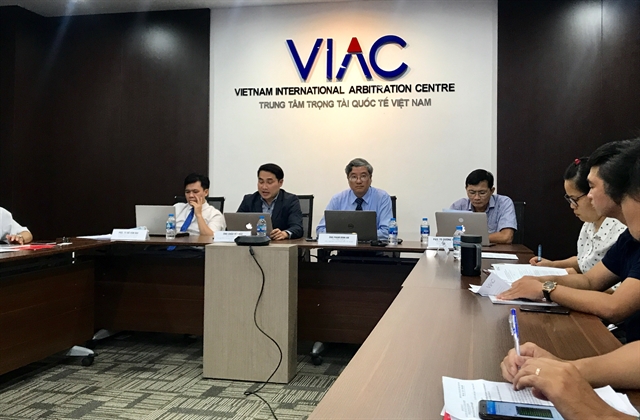 Economy
Economy

The central and local governments and other agencies have announced a number of policies and programmes to help businesses overcome difficulties caused by the COVID-19 pandemic, but the many conditions they have to meet means not many have benefited from them, according to experts.

|
| Speakers at the online seminar titled “Accompanying Businesses to Respond to Risks from the COVID-19 Crisis." — VNS Photo |
HCM CITY — The central and local governments and other agencies have announced a number of policies and programmes to help businesses overcome difficulties caused by the COVID-19 pandemic, but the many conditions they have to meet means not many have benefited from them, according to experts.
Phạm Bình An, deputy director of the HCM City Institute for Development Studies, said: “Việt Nam is one of the most successful countries in fighting the COVID-19 epidemic, but … we had to trade [this] off against significant economic losses.
“Although the social distancing period was short, the endurance of most Vietnamese enterprises is limited, and so they face many difficulties.”
A survey done by the HCM City Union of Business Associations in August on the status of businesses in the city found 84 per cent of them faced difficulty or great difficulty in restoring their production and business activities after the pandemic, 9 per cent had started to overcome the difficulties and only 5 per cent had returned to normal.
Most suffered from lack of funds, falling demand and supply chain disruption.
Only 10 per cent of enterprises have been able to benefit from the support packages while more than 80 per cent have not been able to access them due to many reasons, he told a online seminar titled “Accompanying Businesses to Respond to Risks from the COVID-19 Crisis" held on September 10.
Dr Võ Trí Thành, director of the Institute for Brand and Competitiveness Strategy, said the Government has been proactive and vigorous in both fighting the pandemic and promulgating support policies for businesses and the economy as a whole, but their execution has been slow.
“Enterprises find it hard to benefit from the support since [they] have to carry out many procedures and meet a number of unreasonable requirements.”
For instance, to get bank loans, businesses must have cut their payroll by 50 per cent after the outbreak began, whereas many businesses made great efforts to retain workers to be ready to resume production post-pandemic.
"The Government promptly and vigorously brought in policies to support enterprises. But that determination has not percolated down to all levels and localities. The enforcement of these policies is not synchronised between the central and local levels due to a rigid mindset and some officials’ fear of taking responsibility by approving enterprises’ applications for support packages.
“Therefore, to improve the effectiveness of policies and programmes to support businesses, it is necessary to clear the bottlenecks in the implementation of these policies at the grassroots level."
Nguyễn Hoàng Dũng, an economist and former R&D director of the HCM City Institute of Economy and Management, said: "It is necessary to analyse the reasons why the recent support packages are difficult to disburse. If the conditions are too difficult, they can be relaxed. If banks or officials in charge of approving applications cause difficulties for businesses, that should be corrected immediately.
“If the problems involved in the previous support packages cannot be resolved, the addition of more support packages will not help businesses or the economy.”
The online seminar was held by the Center for International Integration of HCM City and the Vietnam International Arbitration Centre. — VNS




